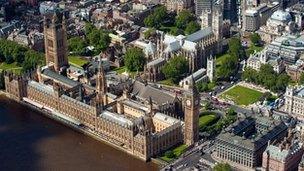Of mice and (gentle)men
- Published
Forget EU referenda or the Autumn Statement. The really titanic struggle being fought out in Westminster at the moment is over the future management of the Commons.
Ever since the fiasco over the attempted appointment of Australian Parliament official Carol Mills to take over from Sir Robert Rogers as Clerk of the Commons, a special committee under Jack Straw has been taking evidence about how best to reform the governance of the House.
This week, I'm told, they're writing their report.

Running Westminster - who's best for the job?
This matters because to run effectively, the Commons needs such mundane things as functional toilets (a bigger issue than one might have imagined), effective IT, expertly-staffed committees, and so on…
And one view - with Mr Speaker leading the charge - is that the organisation has become so big and so complex that it can no longer be managed properly by a gentleman-amateur, whose main training has been in the centuries-old arcana of parliamentary procedure.
This was the thought that underlay the attempt to appoint Carol Mills, a manager rather than a proceduralist, to the top job of the Commons service. But that attempt ran slap into the objection that the Commons is not any old organisation but (in the arresting phrase of Sir Robert Rogers) an organism - reactive, unpredictable, often cussed.
It could not, he insists, be treated in a mechanistic way. In other worlds, only someone steeped in its ways - which pretty much means a Clerk - could understand the wider implications of seemingly straightforward organisational decisions in the world of Westminster.
Under the clerkly guidance of Sir Robert, the Commons apparatus has delivered a 17% cut in its budget, without too many ripples - but there does turn out to be quite a lot of discontent on management issues among MPs and the extent to which that came through was one big development during the inquiry.
Problems like blocked toilets, the refurbishment of the Commons gym and a plague of mice surfaced at the Governance Committee. The written evidence included complaints about the way the cracking in the spectacular glass roof of the atrium in Portcullis House (the big new Commons office building) surfaced in the written evidence.
And the suggestion is that the committee is now tilting in favour of splitting the chief executive role off from the job of Clerk of the House. (Incidentally, the idea that this is a bulwark of the constitution dating back to the immemorial past is mistaken; the clerk assumed the chief executive role under the 1992 Parliamentary and Corporate Bodies Act, and before that the senior administrator, in a rather less coordinated set-up, was the Serjeant at Arms.)
Much of the blame for the problems is pinned not so much on the clerks, but on the impenetrable bureaucratic mechanism above them - there's a management board reporting to the House of Commons Commission, which is the internal administrative organ of the House, peopled by senior MPs and chaired by the Speaker.
These are the venues, it is murmured, in which many a sensible idea for improvement has come to grief, because it impinges on some vested interest or some senior member's idea of what is proper. Reform of the Commission structure may go hand-in-hand with reform of the role of the clerk/chief exec.
So how to judge the Straw Committee's report?
* First, will it propose a chief executive figure? They may or may not be paid more, they may or may not have a Letter Patent from Her Majesty, there may be a bit of cosmetic surgery around the title - maybe "Chief Operating Officer" - but the key test is whether there is a top manager who can take decisions without having the Clerk countermand them. A chief executive under the clerk is not a chief executive at all…so guaranteed independence and a mechanism to resolve disputes, like a process to appeal contentious issues to the Commission, would mean the Speaker had got his way on splitting the role. Anything less would mean his scheme had been watered down.
* Second, is the Commission reformed - and how? It seems likely the Straw Committee will suggest that more outsiders, non-MPs, should sit on the Commission, to bring a bit more management expertise to bear. And there might be enough of them to swing votes from time to time. The suggestion has also been floated, rather delicately, that the Speaker might not chair, or even sit on the Commission in future, and that its MP members should be elected, rather than appointed via the "usual channels". The exact make-up of the next incarnation of the Commission will need careful study, to see whether it will be prepared to take on vested interests and internal prejudices to make the House leaner and more effective.
* Third - the Mills-gate inquest. Did Mr Speaker attempt to skew the appointment process to get his hand-picked candidate? There have certainly been complaints that the Speaker wanted a wording for the job advertisement for a new clerk that watered down the requirement for knowledge of parliamentary procedure, but that's just a symptom of the central dispute in this whole issue. The committee have had a private session with the Speaker and it will be interesting to see if they venture an opinion on claims that he overstepped the mark or even misled the appointment panel.
Pushing too far in any direction could provoke some of the committee members to issue a minority report - but with a veteran fixer like Mr Straw in the chair, I suspect what we'll actually get is an adroitly-worded compromise, that in the best New Labour tradition looks "forward, not back", concentrates on internal reforms and skates over blame games about Carol Mills.